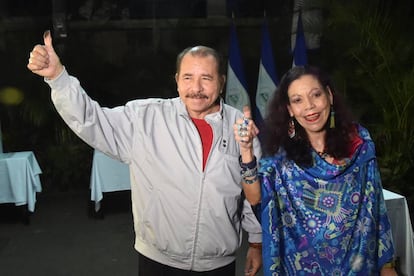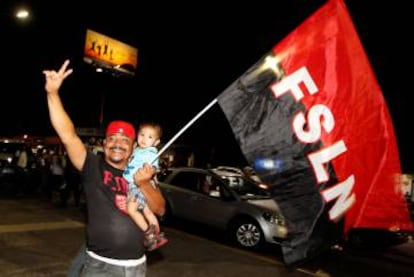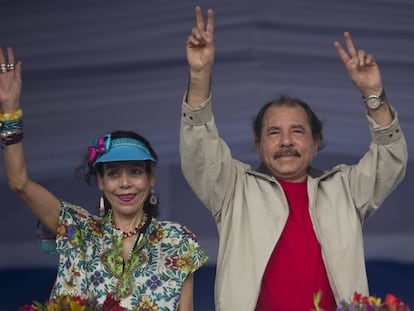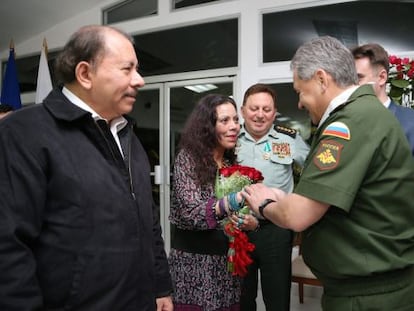Daniel Ortega wins third presidential term in Nicaragua
Early results show overwhelming victory for former guerrilla and his wife in questioned election


Events closely followed President Daniel Ortega’s script at the presidential election held in Nicaragua this Sunday.
Polls were forecasting an overwhelming victory by the Sandinista candidate, and this prediction was confirmed at around midnight, when the president of the Electoral Tribunal, Roberto Rivas, released the preliminary results of the vote.
Rivas announced that Ortega and his wife, Rosario Murillo, had earned 71% of all votes with ballots from 21.3% of polling stations counted.
Ortega will use the outcome of the election to try to legitimate his own style of authoritarian government
Celebrations broke out in several parts of the capital, Managua, where sympathizers of the Sandinista Front expressed their joy at the prospect of seeing Ortega in office for a third consecutive term.
The outcome also confirms the existence of a new family dynasty in the Central American nation, where Ortega’s wife – who serves as vice-president – would step into his husband’s shoes if he were to become unfit for office at any point during the next five years.
The former guerrilla fighter who helped oust the Somozas 37 years ago has thus further entrenched his own family into power.
Questionable impartiality

The opposition had announced hours earlier that turnout was low, calling it a “triumph” of abstention. But election official Rivas stated that turnout was in excess of 65%.
“Even though there was a negative campaign for a no vote, we have democratic voting here,” he said.
The impartiality of Nicaragua’s Electoral Tribunal is seriously questioned by the opposition but also internationally by the European Union and the Organization of American States (OAS).
Ortega will use the outcome of the election to try to legitimate his own style of authoritarian government based on courting the business sector, excluding the opposition, harassing the independent media and exerting complete control over all state institutions.
The model was implemented in 2007, when Ortega returned to power after a previous 11-year period at the helm of the nation between 1979 and 1990, then 16 years as opposition leader.
The outcome confirms the existence of a new family dynasty in the Central American nation
At this point, nobody in Nicaragua expects the three-time president to suddenly open up to reforms that will guarantee a reasonably trustworthy electoral system, bring the opposition back into the fold of politics or be respectful of laws and human rights.
But now he will be facing a politically fractured country and working against an increasingly unfavorable international background.
All eyes are now trained on the United States, where Congress has approved a series of sanctions against Nicaragua which are still pending Senate approval.
The Nicaragua Investment Conditionality Act stipulates that the US can block loans issued to Nicaragua by the World Bank or the Inter-American Development Bank worth $250 million and essential to fund the nation’s infrastructure budget.
Additionally, Ortega’s system of public relief for the poor is under stress because of the political crisis in Venezuela, its oil partner. And the OAS recently drafted a report on Nicaragua’s political situation that has not yet seen the light, but which has forced Ortega to request a direct negotiation with the regional body.
Further complicating matters is the fact that his wife, a poet by trade, does not have the backing of business leaders or the influential sectors of the Sandinista Front.
“Capital is afraid of her because she is very unstable and they don’t know how to reach deals or negotiate with her,” said political analyst Óscar René Vargas.
English version by Susana Urra.









































